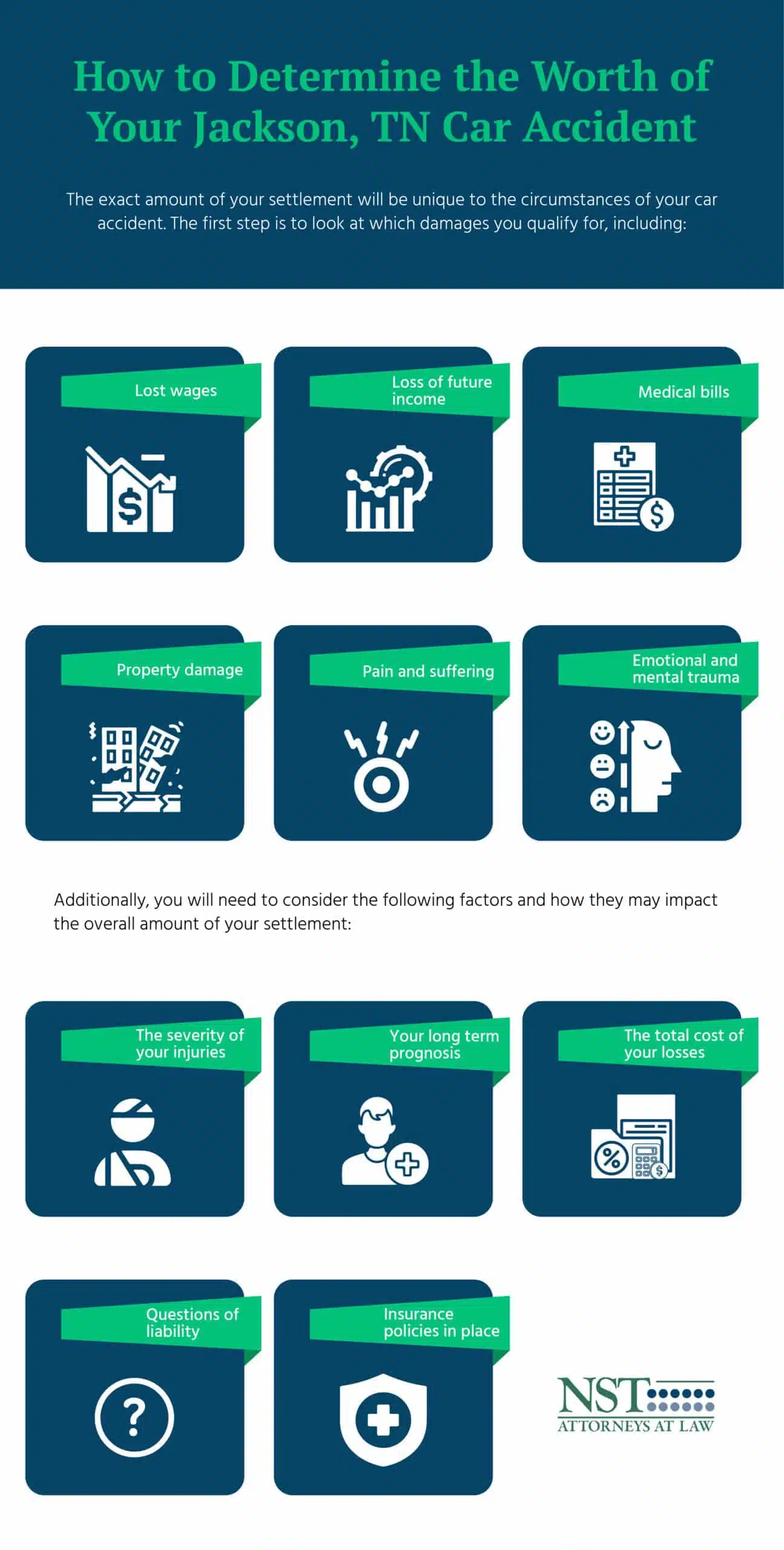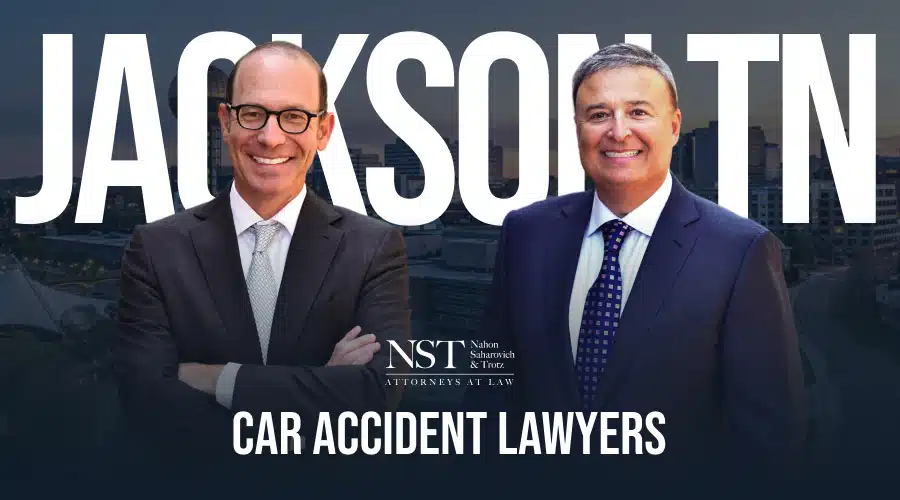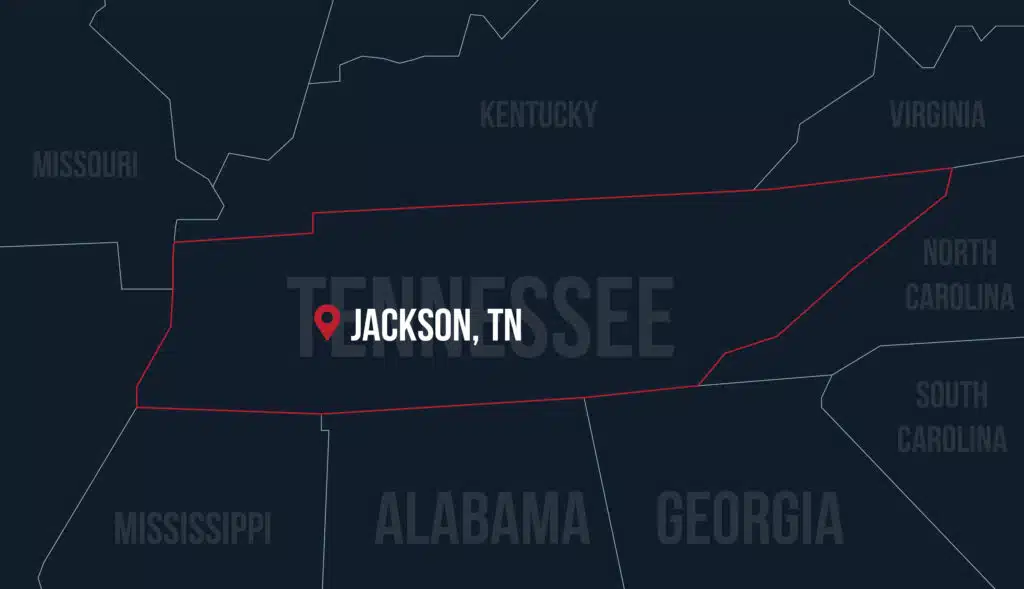
Jackson, TN Car Accident Lawyers

At NST Law, we are dedicated to helping injured individuals and their families get the justice and compensation they deserve.


Expertise
Mr. Trotz has handled injury cases involving auto accidents, slip and fall, premises liability, and negligent security. Every day, Mr. Trotz represents those who have been injured and many of his clients have sustained traumatic and life-altering injuries.


Car accidents can even be fatal—Been in a car accident and unsure what to do next? Facing medical bills and lost wages due to someone else’s negligence? At NST Law, our experienced Jackson, TN car accident lawyers understand the physical, emotional, and financial stress an accident can cause. We’re here to fight for the compensation you deserve.
Reckless and unsafe drivers cause car accidents. Accident victims and their families can hold these irresponsible drivers accountable. In addition, automakers and car-parts manufacturers can be held liable for accidents if they provide defective cars, equipment, or parts.
If you are involved in a car accident that causes an injury or fatality, contact the Jackson, TN car accident attorneys at NST Law. Our lawyers can review your accident and help you determine if you can pursue financial compensation from an at-fault party.
- Why Choose NST Law for Your Car Accident Claim in Jackson, TN?
- Testimonials From Our Jackson, TN Car Accident Injury Clients
- How Much is Your Jackson, TN, Car Accident Case Worth?
- What Kind of Evidence Do I Need for a Jackson, TN, Car Accident?
- What is the Statute of Limitations for Car Accidents in Jackson Tennessee?
- What if I Was Partially at Fault for a Car Accident?
- Common Types of Car Accidents Cases We Handle in Jackson, Tennessee
- Contact the Jackson, TN, Car Accident Lawyers at NST Law Today
- Frequently Asked Questions (FAQ)
- Our Jackson, TN Car Accident Lawyers
Why choose NST law for your car accident claim in Jackson, TN?
Our Jackson, TN car accidents lawyers understand the complexities of car accident cases in Jackson, TN, including common causes and navigating local courts.
As champions for the injured with over 32 years of experience, our experienced personal injury attorneys fight vigorously for our clients to receive maximized compensation. We refuse to settle for any amount less than what our clients deserve. And with a team of over 34 lawyers and 135 support staff, we can help get you the compensation you need.
Some examples of the results we have achieved for our deserving clients include:
- $1.4 million for a Tennessee couple involved in an accident with a driver who hit them head on while driving on the wrong side of the road.
- $2.2 million for a young man who was severely injured in an automobile accident caused by a construction company who negligently failed to place proper traffic signs at an intersection.
- $1.5 million on behalf of a woman who sustained multiple fractures in a collision on the interstate
We fight for injury victims because we are dedicated to making a difference in the lives of individuals during their time of greatest need.
We also pride ourselves on making a difference in the communities we serve, providing scholarships to promising high school graduates and law students, volunteering and financially supporting charities that help children and those in need of food, shelter and clothing.
If you have been injured in an accident, you can count on NST Law to champion your cause with vigor and determination. Don’t delay. Contact the champs today to schedule your free consultation.
Testimonials from our Jackson, TN Car Accident Injury Clients
How much is your Jackson, TN, car accident case worth?

There is no formula to determine how much a Tennessee car accident case is worth. However, there are several factors that can impact how much you can receive in damages in a car accident case. These include:
- What happened during the accident
- The extent of your injuries
- Your exact losses
You may also qualify for any of the following damages in a car accident lawsuit:
- Lost wages
- Loss of future income
- Medical bills
- Property damage
- Pain and suffering
- Emotional and mental trauma
If you experience a severe or catastrophic injury, it’s essential to include claims for future medical expenses and other losses in your car accident lawsuit.
What kind of evidence do I need for a Jackson, TN, car accident?
There is certain evidence that you need to win a legal claim against an at-fault party in a Jackson, TN, car accident case. This evidence includes:
Police Report
A police report is filed immediately after your car accident. To obtain one, you first need to call the police as soon as your accident happens. A police officer will arrive on the scene and take your information along with the information of anyone else involved in your accident. The officer will then use this information to produce their report.
You can obtain a copy of your police report from your local police department. If you need one, give your local police department a call. And if you have any questions about your report, you can ask the police department for further clarification.
The Other Driver’s Information
You may panic in the moments following your car accident and focus exclusively on getting through the post-accident period as quickly as possible. If you’re not careful, you may even forget to obtain the other driver’s information. Don’t let this happen to you.
It is paramount to collect the other driver’s information after a car accident. Get the driver’s name, phone number, and other relevant details. Ask the driver for their license to confirm this information. If necessary, you can use your smartphone to snap a photo of the driver’s license.
Along with the other driver’s contact information, request for their insurance information. You may need the other driver’s insurance information to get financial compensation for the accident.
If you are hesitant about collecting the other driver’s information in a car accident, get the police to help. Call 911 after your accident, and a police officer can retrieve this information for you.
Evidence at the Accident Scene
Common accident-scene evidence includes:
- Photographs: Documented car damage, road conditions, and other factors relating to an accident.
- Witness testimonials: Firsthand insights into an accident from people who saw it happen or responded to the incident.
- Official records: A police report that is part of the public record.
Collect as much evidence as you can following your car accident. With plenty of evidence at your disposal, you can build a strong case against the party responsible for your accident.
Medical Bills
You can pay hundreds of thousands of dollars for medical treatment after your car accident. If someone else is responsible for your accident, this individual can be held accountable for your medical expenses.
Keep track of your medical bills in the days, weeks, and months after your car accident. You may qualify for economic damages, allowing you to recover some or all of the costs of these bills from the at-fault party.
What Is the statute of limitations for car accidents in Jackson Tennessee?
There is a one-year statute of limitations for personal injury claims in Tennessee. This means you have one year from the date of your car accident to file a lawsuit against an at-fault party for damages.
In wrongful death car accident cases, the one-year statute of limitations still applies. A family member of the accident victim can sue the at-fault party for wrongful death. This individual may recover economic or non-economic damages for their loss.
It is very important to work quickly to submit a legal claim against an at-fault party following a car accident. With NST Law’s Jackson, TN personal injury attorneys helping you gather evidence, you will be well-equipped to file a case on time and recover full compensation.
What if I was partially at fault for a car accident?
Comparative negligence applies in Tennessee personal injury cases where fault can be assigned to both a plaintiff and defendant. If you are partially at fault in a car accident case, you may lose a portion of your damages.
For example, a car accident victim can file a lawsuit for $10,000 in damages. If a judge or jury rules that the victim is 20% at fault for the accident, this individual will be awarded $8,000.
The knowledgeable car accident attorneys at NST Law can help you recover the highest possible compensation from an at-fault party. We’ll review your case, gather evidence, and put together a strong argument on your behalf. We can prove to a judge or jury that the at-fault party is primarily responsible for your accident.
Common types of car accidents cases we handle in Jackson, Tennessee
Unfortunately, car accidents are a reality for drivers in Jackson, Tennessee, just like anywhere else. If you’ve been involved in a wreck, understanding the most common types of car accidents can help you determine how to proceed.
Here’s a look at some of the car accident cases our personal injury lawyers in Jackson, Tennessee see and handle most frequently:
Rear-End Collisions: These are some of the most common accidents, often occurring at intersections or due to following too closely. When a driver fails to stop in time and hits the car in front of them, it can cause whiplash, back injuries, and other damage.
Head-On Collisions: These are among the most severe accidents, often resulting in serious or even fatal injuries. Head-on collisions can happen due to factors like driving under the influence, distracted driving, or attempting to pass in unsafe conditions.
Intersection Accidents: Traffic signals and stop signs are meant to prevent accidents, but red light running, failing to yield, and misjudging turning distances can all lead to serious intersection crashes.
Lane-Change Accidents: Swift and reckless lane changes without proper signaling can easily lead to accidents, especially on busy roads.
Sideswipe Accidents: These accidents often occur on multi-lane roads when drivers fail to maintain their lane or are not aware of their blind spots.
Parking Lot Accidents: Parking lots can be surprisingly dangerous, with accidents happening due to inattentive drivers, backing out of spaces without looking, or dooring accidents (opening a car door into the path of someone on a bicycle or motorcycle).
This is not an exhaustive list we handle as car accidents can happen in many other ways including rideshare accidents.
Contact the Jackson, TN, car accident lawyers at NST Law today

NST Law’s Jackson, TN, car accident lawyers are here to help you submit a successful legal claim. To date, our personal injury clients have secured over $2 billion in settlements. Our team will do everything in our power to ensure you get the best results in your case.
Our Tennessee car accident lawyers can meet with you to discuss your case. To find out more or request a free consultation, contact us online or call us at 731-316-0105.
FREQUENTLY ASKED QUESTIONS (FAQ)
Below are answers to questions we frequently receive.
We work on a contingency fee basis, which means we do not charge any fees unless and until we win you compensation.
Mississippi is a pure comparative negligence state, which means you are entitled to receive compensation as long as you are less than 100 percent at fault. However, your compensation must be adjusted accordingly.
Anyone who operates or rides in a motor vehicle should be prepared with knowledge of what to do in the event of a collision with another car, structure, or fixed object. Of course, health should be a person’s top priority. However, there are additional steps that can be taken at the scene of the crash and added to your checklist.
There are many factors to consider in car accidents, which could point to the liability of the following:
- The driver of the vehicle in which you rode
- The driver of an opposing vehicle
- The owner of any vehicle involved if the driver is not the owner, including businesses with whom the driver is employed
- Vehicle manufacturers or vehicle component manufacturers if the accident was caused by faulty equipment (such as a defective airbag)
- Federal, state, or local governments when road conditions cause the accident
- Bar or liquor store owners who knowingly allowed an intoxicated individual to drive
- Rideshare companies
- Construction companies
Our Jackson, TN Car Accident Lawyers
Founding Member – Senior Partner
Phone: (731) 427-5550
Attorney
Phone: (731) 427-5550
Attorney
Phone: (731) 427-5550
Founding Member – Senior Partner
Phone: (731) 427-5550
Attorney
Phone: (731) 427-5550
Attorney
Phone: (731) 427-5550
Founding Member – Senior Partner
Phone: (731) 427-5550
Attorney
Phone: (731) 427-5550
Attorney
Phone: (731) 427-5550
Founding Member – Senior Partner
Phone: (731) 427-5550
Attorney
Phone: (865) 684-1000
Attorney
Phone: (731) 427-5550
Attorney
Phone: (731) 427-5550
Attorney
Phone: (731) 427-5550
Attorney
Phone: (731) 427-5550
Attorney
Phone: (731) 427-5550
Attorney
Phone: (865) 684-1000
Attorney
Phone: (731) 427-5550
Attorney
Phone: (731) 427-5550
Attorney
Phone: (731) 427-5550
Attorney
Phone: (731) 427-5550
Attorney
Phone: (731) 427-5550
Attorney
Phone: (731) 427-5550
Attorney
Phone: (731) 427-5550
Attorney
Phone: (731) 427-5550
Attorney
Phone: (731) 427-5550

 Skip to content
Skip to content

























